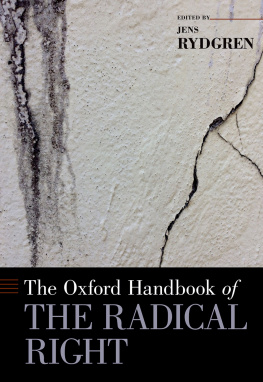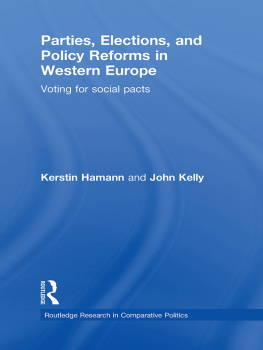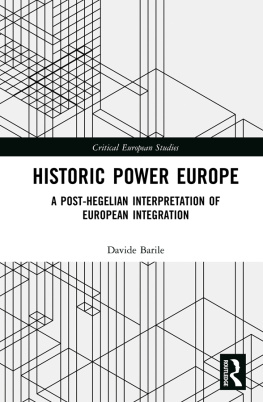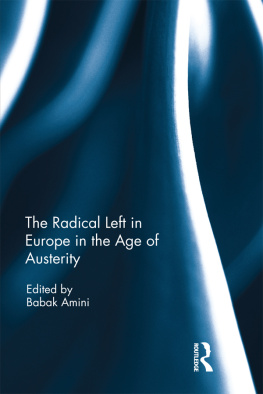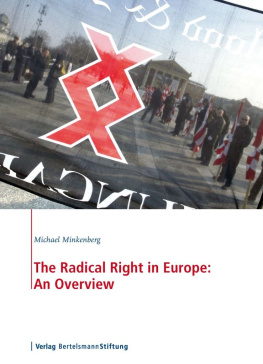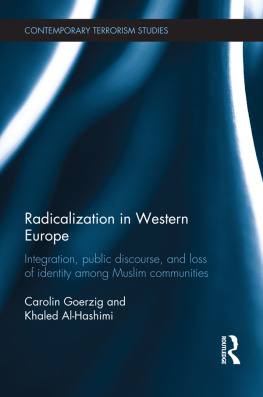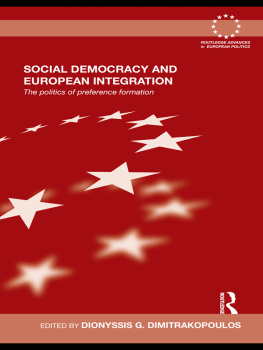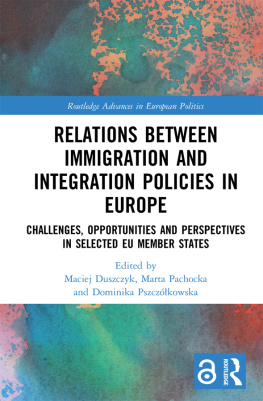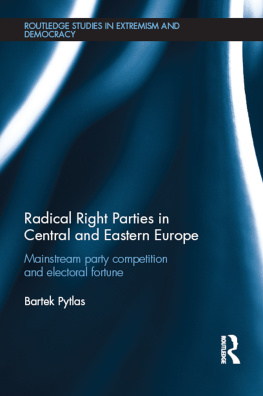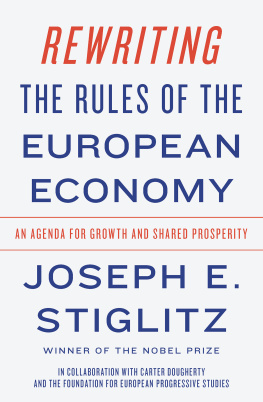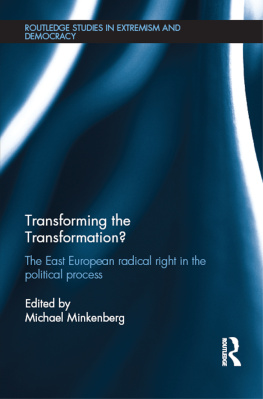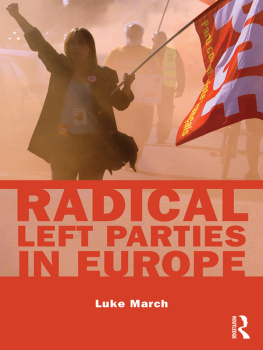This book would not have been possible without the support of many colleagues, friends, and institutional funders. I have many people to thank for making this journey possible. The project grew out of my doctoral dissertation at the University of California, Berkeley. My dissertation committeeNeil Fligstein, Dylan Riley, and Jason Wittenbergdeserve my deepest thanks for their patience and encouragement. I also wish to thank several Berkeley faculty members who did not serve in a formal capacity on this project but whose advice on everything from writing style to the big ideas made its completion possible. Victoria Bonnell, Irene Bloemraad, Claude Fischer, Anne Swidler, Christine Trost, and Margaret Weir have my deepest appreciation. Beyond Berkeley, I owe the most gratitude to John Boli, my undergraduate mentor who encouraged me to pursue a doctorate in the first place, and to Christian Joppke at the University of Bern whose support gave me the time to revise the dissertation. Without Anton Shekhovtsovs tireless editing and Andreas Umlands initial suggestion to publish the book as part of the series, this project would have never come to fruition. To these two fellow scholars, I am truly thankful.
This book is made possible by generous financial support from several research institutions. The National Science Foundation (Graduate Research Fellowship); the International Research and Exchanges Board (IREX) with funds provided by the United States Department of State through the Title VIII Program; the Social Science Research Council (through the Title VIII Eurasia Program Dissertation Development Award); the Berkeley Program in Eurasian and East European Studies (BPS); Berkeleys Center for the Study of Social Change Graduate Fellows Training Program; the Berkeley Sociology Department; and the postdoctoral fellowship at the University of Bern, Switzerland, all provided support at key points of the research and writing process.
Last, but certainly not least, any amount of words would be inadequate to express my gratitude and debt to my parents, who overcame unbelievable hardship and insurmountable odds when they emigrated from the Soviet Union in 1991. Needless to say, I would not be the person that I am today were it not for their bravery, determination, unconditional support, and seemingly limitless energy. Everything that I am is thanks to them.
Chapter One
Introduction
It remained only to decide the political shape of the new order that must now replace the unrecoverable past.
Tony Judt, Postwar: A History of Europe Since 1945
Europe will not be made all at once, or according to a single plan. It will be built through concrete achievements which first create a de facto solidarity.
The Schuman Declaration
Ravaged by years of war, mid-twentieth century Europe was a disaster in every meaning of the word. World War II had effectively bankrupted the major European economies. Countless cities in the East and West lay wasted, and the sheer magnitude of human lossover 60 million killedleft the European continent devastated and its remaining population exhausted. In 1945, an observer standing on the rubble of Berlin, Warsaw, or any other post-war city, would find it difficult to predict what the future could hold. With the past effectively annihilated, a new Europe was bound to take shape, but the type of economic, political, and social order that would arise from those ashes by the end of the twentieth century remained unimaginable in 1945.
If our casual observer were transported from the wasteland of immediate postwar Europe to the Europe of 2014 , the economic prosperity of the once ruined central European cities such as Berlin or Warsaw would immediately have shocked her. And if she spent more time there, she would discover even more surprising and once unimaginable changes: our observer, for example, could board a train from Berlin to Rome without ever being asked to show her passport. Passing through Austria and Switzerland, she would not need to be concerned whether she was holding the appropriate documents, and upon arrival in Rome, she could use the same currency she had elsewhere throughout the continent. I f she decided to look for a job in Italy, she could start immediately, without needing to obtain a work permit. If she were a well-educated professional, she would find others like her who considered themselves Europeans, just as much or even more so than Germans or Italians. Finally, she would be quite surprised to learn that the Soviet Union, which, in her time, controlled all lands up to the German border, and even half of Berlin, no longer existed , and that most of the once socialist East ern Bloc republics now constitute d a twenty-seven country union, replete with its own supra-national political institutions. The rhetorical device of the postwar observer only goes so far, but it does illustrate the dramatic micro and macro changes that have taken place in Europe in the last seventy years.
Many of these changes such as the Schengen zone agreement allowing for the free movement of individuals between countries and the common currency of the Euro have made contemporary Europe feel more like a single country than a collection of once antagonistic nation-states. The European Union, which began as a limited coal and mining partnership , now stretches from Lisbon to Romania. The Balkan states and Turkey are now candidate countries, and, further east, countries such as Ukraine are waiting to sign association agreements. S tep-by-step, Europe has become ever more economically and politically interdependent; meanwhile , EU member states have prospered tremendously in the process. Among the EUs most important achievements has been the maintenance of long-term peace on the continent. In recognition of this success , the EU was awarded the Nobel Peace Prize in 2012 for over six decades contributed to the advancement of peace and reconciliation, democracy and human rights in Europe (Nobel Committee 2012) . From our 2014 vantage, another world war on Europes soil is practically unthinkable.
But economic and political interdependence was never the sole goal of European integration to the architects of the EU project. Enshrining the notion of European social solidarity, representatives
In many ways, the European Union has lived up to this ideal of supra-national solidarity: compared to fifty or even twenty years ago, more Europeans speak foreign languages, spend significant time outside their country, and identify as Europeans (Fligstein 2008; Risse 2010). While these trends do provide some evidence for increasing cultural integration, scholars examining European identity agree that no overarching sense of Europeanness has emerged (Fligstein et al. 2012). For every individual that identifies solely as European, there are ten times as many who see themselves in strictly national terms . Residents of Europe continue to identify primarily as German, Italian, or Romanian. In fact, many see the EU as an elitist project, imposed from the top on an unwilling population.
This charge of elitism may stem from the fact that the average European rarely interacts with any of the major EU institutions, such as the European Parliament. Yet, EU politics have become increasingly influential in national politics (Risse 2010). Rather than embracing this influence, many individualsespecially those who do not see themselves as benefitting from the EU projectfeel not only disconnected from the EU , but also resentful of its interference in what were onc e solely national issues. The 2008 economic crisis intensified these sentiments, as national governmentswithout control over their national currency were left helpless to abate the crisis . Further, the EUs highly unpopular austerity policies , pushed through in already hard - hit countries such as Spain, Greece, and Italy, have confirmed the sentiment that EU policies benefit European elites at the expense of the majority. Unevennessbetween countries and individualsthus characterizes New Europe more so than cultural unity.


